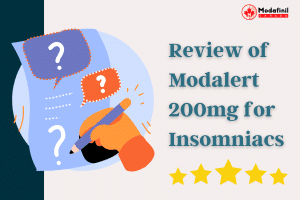Modafinil 200mg pros cons and all that you want to know
Modafinil effectively treats narcolepsy, a sleep disorder characterized by excessive daytime sleepiness. However, Modafinil has also been found to have cognitive-enhancing effects and is sometimes used off-label to improve focus, attention, and cognitive function in individuals without narcolepsy. In this article, we’ll explore the pros and cons of Modafinil to help you decide whether it’s right for you.
A summary of Modafinil
It is a wakefulness-promoting medication used to treat excessive sleepiness caused by narcolepsy, shift work sleep disorder, and obstructive sleep apnea. It is classified as a central nervous system (CNS) stimulant and was originally approved in the United States in 1998 to treat narcolepsy. In 2003, it was approved for the treatment of shift work sleep disorder, and in 2007, it was approved for the treatment of obstructive sleep apnea.
Though its exact mechanism of action is still unknown, it is thought to work by increasing dopamine levels in the brain. Dopamine is a neurotransmitter in our brain known for promoting wakefulness and attention. It also increases norepinephrine and orexin levels in the brain. Norepinephrine is a neurotransmitter that helps to keep us alert and focused, while orexin is a neuropeptide that helps to regulate wakefulness.
It has been proven that it improves wakefulness, vigilance, and reaction time in people with excessive sleepiness. It has also been shown to improve working memory and attention in healthy adults. It is generally well-tolerated; the most common side effects are headache, nausea, anxiety, and insomnia.
It’s time to discuss the pros and cons of the drug in detail.
Pros of Modafinil
Some potential benefits of Modafinil include the following :
1. Improved attention and focus: Modafinil has increased attention and focus in healthy individuals and those with attention deficit hyperactivity disorder (ADHD) or other cognitive impairments. It does so by elevating certain neurotransmitters’ levels in the brain, such as dopamine, norepinephrine, and histamine. These neurotransmitters regulate the brain’s arousal and attention systems, and by increasing their levels, it may make it easier for individuals to stay alert and focused.
2. Increased cognitive flexibility and working memory: Modafinil has been found to improve cognitive flexibility, which is the ability to adapt to changing task demands and switch between tasks efficiently. The medication has also proven its efficacy in enhancing working memory, which is the ability to hold and manipulate information in mind temporarily.
The exact mechanisms of how Modafinil improves cognitive flexibility and working memory still need to be fully understood. Still, research suggests that it may work by affecting the activity of certain neurotransmitters in the brain.
One theory is that it improves cognitive flexibility and working memory by increasing dopamine levels in the brain. Another theory is that the drug may do so by increasing the activity of norepinephrine in the brain.
It’s also worth noting that Modafinil has been found to enhance the activity of the prefrontal cortex, which is the brain area responsible for executive functions such as decision-making, planning, working memory, and cognitive flexibility. By enhancing the prefrontal cortex activity, Modafinil may make it easier for individuals to perform cognitively demanding tasks, including those requiring cognitive flexibility.
3. Increased motivation and drive: Modafinil has been found to increase motivation and drive in healthy individuals and those with depression or other conditions characterized by low motivation. The drug increases dopamine release in the brain, a neurotransmitter that plays an important role in attention and motivation. Dopamine is also involved in the brain’s reward system and may make activities that require attention and focus more rewarding and enjoyable.
It’s important to note that Modafinil is a prescription medication and should be used under the supervision of a physician. Another theory is that it may improve cognitive flexibility by increasing the activity of norepinephrine in the brain.
Though its exact mechanism of action is still unknown, it is thought to work by increasing dopamine levels in the brain. Dopamine is a neurotransmitter in our brain known for promoting wakefulness and attention. It also increases norepinephrine and orexin levels in the brain. Norepinephrine is a neurotransmitter that helps to keep us alert and focused, while orexin is a neuropeptide that helps to regulate wakefulness.
It has been proven that it improves wakefulness, vigilance, and reaction time in people with excessive sleepiness. It has also been shown to improve working memory and attention in healthy adults. It is generally well-tolerated; the most common side effects are headache, nausea, anxiety, and insomnia.
It’s time to discuss the pros and cons of the drug in detail.
Cons of Modafinil
While it has some potential benefits, there are also some potential downsides and side effects associated with modafinil use:
Insomnia: Modafinil is a long-acting medication that can affect the body for several hours after taking it. This can make it difficult for individuals to fall asleep even if they take the medication early in the day. This can be particularly problematic for those who already have sleep disorders.
Headaches: By increasing the levels of certain neurotransmitters such as dopamine, norepinephrine, and histamine, the drug may impact the usual brain functions, leading to headaches. Additionally, headaches can be caused by the vasoconstriction that it can cause, as it reduces blood flow to the brain, which can lead to headaches.
Nausea: When you feel discomfort in the upper stomach with an involuntary urge to vomit, it’s called nausea. It can be caused by the impact of Modafinil on the gut, which may reduce gut contractions, leading to nausea or stomach discomfort.
Anxiety: You may feel unease, such as worry or fear. It could be mild or severe. It can cause anxiety, particularly at high doses. The drug can affect the levels of stress hormones such as cortisol, which can contribute to feelings of anxiety.
Agitation: These neurotransmitters are involved in regulating the brain’s arousal and attention systems, and by increasing their levels, Modafinil may affect the normal functioning of the brain, leading to agitation.
Dizziness: You may feel lightheadedness or unsteadiness coupled with nausea, which can affect balance. The exact mechanism by which Modafinil causes dizziness is not entirely clear, but it’s due to the drug’s impact on neurotransmitters and the cardiovascular system.
Cardiovascular effects: Modafinil can increase heart rate and blood pressure, which can concern individuals with hypertension or other cardiovascular conditions.
Note: It’s important to note that not all people will experience these side effects of it. Most of the time, these side effects are mild and wear off over time. However, if they are severe or persistent, discussing dosage adjustment, drug timing, or alternative treatment options with your doctor before you start taking Modafinil is imperative.
Conclusion
Modafinil has many potential benefits and drawbacks. It may be useful for people who struggle with focus or narcolepsy, but it can also have serious side effects if used improperly. Before taking Modafinil, you should carefully weigh the pros and cons to decide whether this drug is right for you. Talk to your doctor about any concerns or questions that you may have so they can help guide your decision-making process.
References:-
https://www.goodrx.com/modafinil/what-is
https://www.buzzrx.com/provigil-coupon/pros-cons
https://www.quora.com/What-are-the-pros-and-cons-of-Modafinil
https://www.bbc.com/news/magazine-35091574
https://www.drugs.com/cons/modafinil.html
https://journals.plos.org/plosone/article?id=10.1371/journal.pone.0227818




